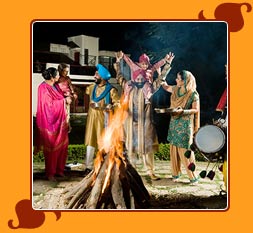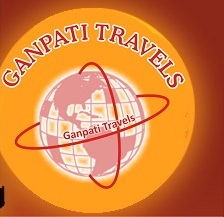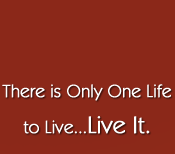Lohri, is celebrated every year on
13th of January. It is a festival to worship fire. Lohri Festival is
celebrated with great pomp in North India. At this time Earth starts moving
towards the sun marking the auspicious period of Uttarayan. First Lohri is
very important for the newly wed and the new born babies as it marks
fertility.

At
night, people gather around the bonfire and throw til, puffed rice &
popcorns into the flames of the bonfire. Prayers are offered to the bonfire
seeking abundance & prosperity. People make merry by dancing &
singing traditional folk songs.
How to Celebrate
Lohri?Lohri celebrations are marked by traditional songs and
dances. People dress up nicely on the long-awaited bonfire festival. Lohri
calls for family get-togethers and lavish dinners with sarson ka saag &
makki ki roti. The day ends with prayers for a good harvest.
Lohri
Fairs or Lohri MelasOn Lohri day, colorful fairs or melas are held
in many of the villages of Punjab, Himachal and Haryana. These are basically
seasonal fairs that celebrate the harvest for the fertility of fields. Lohri
fairs are enchantingly picturesque with bustling market springing up, in
which food and products of local handicrafts such as toys, glass bangles and
an assortment of all kinds of articles for domestic use are on display.
People come to participate in Lohri Melas from far-off places, trudging
dusty distances.
Men women and children of all ages, classes and
creeds flock in hundreds and enjoy the numerous fascinating features of the
fair; races, wrestling bouts, singing, acrobatics, etc. They play on folk
instruments, such as vanjli and algoza. There is fun and frolic all round
the place where the Lohri fair is organized. The old as well as the young
enjoy these fairs to the fullest as these fairs reflects the joy of the
community. People enjoy the day inspite of cold weather as they very well
know that warmth is not far away. Lohri festival is not just an occasion for
festivity and mass gathering but it is an unbounded expression of the spirit
of the inner freedom, of creative pride, of zest for life, and of colorful
traditions of the people of Punjab.
Lohri Melas in
TownsIn big cities and towns Lohri Melas are organized before or
after the festival to give people an opportunity to get together. Stalls of
handicraft and other products besides those selling food are organized in
these fairs. Bonfire, joyful competitions along with swings and games are
other attractions of traditional Lohri Melas. On several occasions, Lohri
Melas are graced by popular singers and dancers making them all the more
enjoyable. Punjabis living outside India too organize Lohri Melas and enjoy
the festival to the hilt.
The Legends of Lohri There
are few renowned legends associated with this historic festival of Punjab,
the most significant of them being the Dullah Bhatti, which evolved around
the Festival of Lohri. Lohri marks the end of the dreary and awfully cold
month of Pos (mid Dec to mid Jan) and the next day of Makar Sakranti, ushers
in the bright and sunny month of Magh. This is particularly a happy occasion
for the couples who for the first time celebrated Lohri after their marriage
and also the first Lohri of the son born in a family.
Influence
of LohriLohri is one such festival which works as a tie-up bond for
various communities. The festival is celebrated with great fervor and
exuberance especially in North India. Farmers celebrate this harvest
festival with traditional dances and songs. It falls on the 13th January
when the Earth starts moving towards the sun marking the auspicious period
of Uttarayan.
Astrological Influence:The
earth leans towards the sun along the Tropic of Capricorn (Makara rekha)
from the day following Lohri, also known as Winter Solstice. The earth,
farthest from the sun at this point of time, starts its journey towards the
sun along its elliptical orbit, thus heralding the onset of spring. It is
this transition which is celebrated as Lohri.
Spending
Time with Family and Friends:By celebrating Lohri altogether,
people come across importance of agriculture, harvest and also relationship
values. It gives a chance to spend time with family and friends. The main
event of the day is huge bonfire with all the family members dancing around
the holy fire. Thus, this festival is taken as a day to worship fire.
Bonfires are also symbolic in paying homage to the Sun God as Lohri is the
festival connected with the solar influence.






